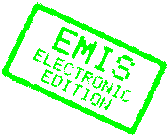Combinatorial S>n-Modules as Codes
Robert A. Liebler
and Karl-Heinz Zimmermann
DOI: 10.1023/A:1022485624417
Abstract
Certain \mathbb Z S n \mathbb{Z}S_n -modules related to the kernels ofincidence maps between types in the poset defined by the natural productorder on the set of n-tuples with entries from {1, \frac{1}{4} \ldots , m} are studied as linear codes (whencoefficients are extended to an arbitrary field K). Theirdimensions and minimal weights are computed. The Specht modules areextremal among these submodules. The minimum weight codewords of theSpecht module are shown to be scalar multiples of polytabloids. Ageneralization of t-design arising from the natural permutation S n-modules labelled by partitions with mparts is introduced. A connection with Reed-Muller codes is noted and acharacteristic free formulation is presented.
Pages: 47–68
Keywords: symmetric group; Specht module; $t$-design; Reed-muller code
Full Text: PDF
References
1. R.E. Blahut, Theory and Practice of Error Control Codes, Addison Wesley, Reading, Mass., 1983.
2. R.W. Carter and G. Lusztig, "On the Modular Representations of the General Linear and Symmetric Groups," Math Z. 136(1974), 193-242.
3. C.W. Curtis and I. Reiner, Representation Theory of Finite Groups and Associative Algebras, Interscience, New York, 1962.
4. P. Frankl and J. Pach, "On the number of sets in a null t-design," European Journal of Combinatorics 4, (1983), 21-23. LIEBLER AND ZIMMERMANN
5. J.M. Goethals, "Threshold Decoding-A Tentative Survey," in: Coding and Complexity, ed. by G. Longo, Springer-Verlag, New York, 1975.
6. U. Eidt, "Uber Moduln als Codes," Master Thesis, University of Bayreuth, Bayreuth, 1992.
7. G. James, "The Representation Theory of the Symmetric Groups," LNM 682, Springer-Verlag, New York, 1978.
8. G. James and A. Kerber, "The Representation Theory of the Symmetric Group," Encyclopedia of Mathematics and its Applications, Addison Wesley, London, 1981.
9. T. Kasami, S. Lin and W.W. Peterson, "Polynomial Codes," IEEE Trans. Info. Theory, 14 (1968), 808-814.
10. A. Kerber, "The Combinatorial Use of Finite Group Action," BI Wissenschaftsverlag, Manhiem 1991.
11. R.A. Liebler, "On Codes in the Natural Representation of the Symmetric Group," in: Combinatorics, Representations and Statistical Methods in Groups, Marcel Dekker, 1980.
12. F.J. Macwilliams and N.J.A. Sloane, The Theory of Error-Correcting Codes, North Holland, Amsterdam, 1978.
13. R.M. Wilson, "A Diagonal Form for the Incidence Matrices of t-Subsets vs. K-Subsets," Europ. J. Combinatorics 11, (1990), 609-615.
14. A. Wong, "Modules as Codes," Masters Thesis, Colorado State University, 1976.
2. R.W. Carter and G. Lusztig, "On the Modular Representations of the General Linear and Symmetric Groups," Math Z. 136(1974), 193-242.
3. C.W. Curtis and I. Reiner, Representation Theory of Finite Groups and Associative Algebras, Interscience, New York, 1962.
4. P. Frankl and J. Pach, "On the number of sets in a null t-design," European Journal of Combinatorics 4, (1983), 21-23. LIEBLER AND ZIMMERMANN
5. J.M. Goethals, "Threshold Decoding-A Tentative Survey," in: Coding and Complexity, ed. by G. Longo, Springer-Verlag, New York, 1975.
6. U. Eidt, "Uber Moduln als Codes," Master Thesis, University of Bayreuth, Bayreuth, 1992.
7. G. James, "The Representation Theory of the Symmetric Groups," LNM 682, Springer-Verlag, New York, 1978.
8. G. James and A. Kerber, "The Representation Theory of the Symmetric Group," Encyclopedia of Mathematics and its Applications, Addison Wesley, London, 1981.
9. T. Kasami, S. Lin and W.W. Peterson, "Polynomial Codes," IEEE Trans. Info. Theory, 14 (1968), 808-814.
10. A. Kerber, "The Combinatorial Use of Finite Group Action," BI Wissenschaftsverlag, Manhiem 1991.
11. R.A. Liebler, "On Codes in the Natural Representation of the Symmetric Group," in: Combinatorics, Representations and Statistical Methods in Groups, Marcel Dekker, 1980.
12. F.J. Macwilliams and N.J.A. Sloane, The Theory of Error-Correcting Codes, North Holland, Amsterdam, 1978.
13. R.M. Wilson, "A Diagonal Form for the Incidence Matrices of t-Subsets vs. K-Subsets," Europ. J. Combinatorics 11, (1990), 609-615.
14. A. Wong, "Modules as Codes," Masters Thesis, Colorado State University, 1976.
